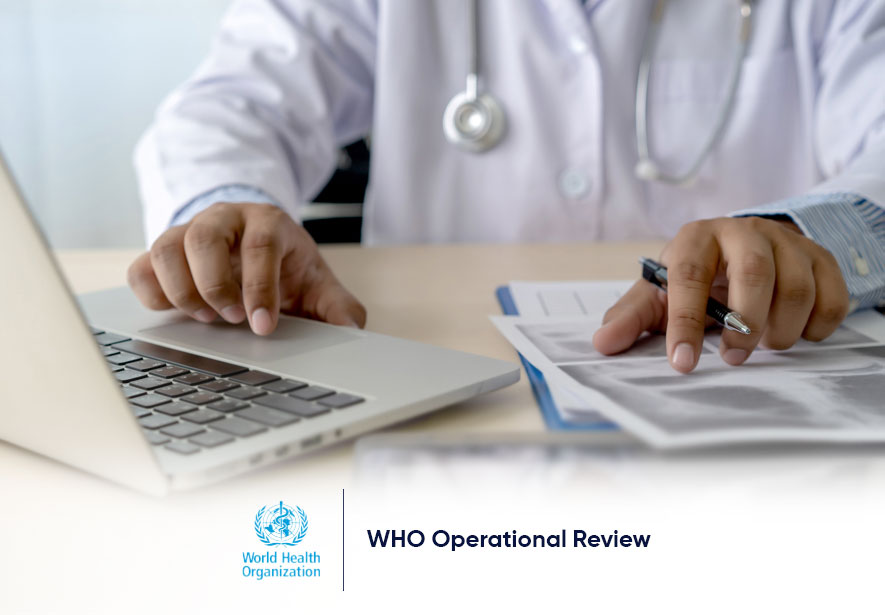
Success Stories
WHO Review: How Digital Health Systems Strengthened Türkiye’s Earthquake Response
The World Health Organization (WHO) recently published a comprehensive operational review, ‘WHO Operational Review of Türkiye's Approach to Noncommunicable Diseases During the Emergency Response to the 2023 Earthquakes,’ focusing on Türkiye’s healthcare system’s preparedness and response to noncommunicable diseases (NCDs) during the devastating earthquakes which struck southern and central Türkiye and northern and western Syria in 2023. According to the review conducted by the WHO and Türkiye’s Ministry of Health, the country’s extensive package of health services, including Personal Health Record (PHR) System (e-Nabız), Central e-Prescription (Reçetem) and Pharmaceutical Track and Trace System (İlaç Takip Sistemi - İTS) along with the chronic NCD (Non-Communicable Diseases) management and support program for refugees, made significant contributions to the effectiveness of healthcare during this disaster period. Three health information solutions we developed – e-Nabız, Reçetem and İTS – which are among the fundamental components of Turkey's digital health system, made critical and significant contributions to healthcare services throughout this unprecedented crisis, helping the system function seamlessly.

Healthcare Disruptions due to the 2023 Türkiye Earthquakes
On 6 February 2023, a series of powerful earthquakes occurred in Türkiye and affected 10 cities of the country. These earthquakes caused approximately 50000 deaths and the displacement of 3 million individuals. Due to the earthquakes, Türkiye’s healthcare system encountered various challenges such as the loss of health workers, widespread damage to healthcare facilities, the lack of access to electricity and so on. Despite these challenges, the country’s strong health infrastructure enabled the continuity of essential health services including for patients with NCDs. Our digital health solutions, specifically designed to enhance national healthcare systems in daily life and in case of emergency, have demonstrated remarkable outcomes in improving access to quality care without disruption during the earthquake period.
According to the WHO, Türkiye faces a significant burden of NCDs with approximately %90 of annual deaths attributed to these diseases. In the country, cardiovascular conditions, Alzheimer’s disease, cancers, chronic respiratory diseases and diabetes are among the most prevalent NCDs. The 2023 earthquakes affected a lot of people and created a hard period for individuals with these diseases. This circumstance made the availability and accessibility of NCD services along with the management of these diseases even more critical.

Centralized, accessible and interoperable health information systems are prominent in the management of NCDs during and after natural disasters. These systems have a critical importance for the continuity of care, patient follow-up, medication supply and so on. The centralization of the systems facilitates the coordination and monitoring of the healthcare response during emergencies by collecting health data at a central point and providing real-time access to health information of patients. Thanks to these features, healthcare professionals, providers and authorities can make more informed and faster decisions to address the needs of the population, especially those with NCDs, in case of emergency. Additionally, the health information of displaced patients is not lost due to disasters. The interoperability of these systems supports the data sharing between different healthcare facilities and providers. If healthcare systems are not compatible with each other, patients’ data might have difficulty moving between different systems, disrupting treatment processes. Compatibility ensures that different hospitals and clinics can access patient information using the same data system. The accessibility of the systems is also crucial as it enables patients, healthcare professionals and other relevant stakeholders to ensure continuous and coordinated care, regardless of location. With appropriate accessibility, people, especially displaced patients, can access their health information anytime and anywhere easily after disasters.

As leading the healthcare IT industry, we are proud to contribute to the whole healthcare infrastructure of Türkiye with our digital health products which are tailored to the specific needs of patients, healthcare professionals, providers and authorities. In the context of the 2023 earthquake period, our Personal Health Record, Central e-Prescription and Pharmaceutical Track and Trace System, which is branded as DrugXafe, came to the forefront in maintaining the uninterrupted flow of healthcare services. Within the physical and psychological devastation, these products helped mitigate potential outages in the treatment of patients with NCDs by enabling healthcare professionals and providers across the country to not only access and share necessary health data easily and quickly, but also to coordinate care, track patient progress and ensure continuity in treatment.
The National Health System, called as ‘e-Nabız’ in Türkiye, is a hybrid system that combines a Health Information Exchange (HIE) System, which allows healthcare professionals to access citizens' electronic health records (EHRs), with a Personal Health Record (PHR) System, which enables citizens to manage their electronic health records. This system collects health data from all public and private healthcare facilities nationwide and manages citizens' entire health data. This platform serves as a centralized hub for healthcare professionals, enabling them to access electronic health records and vital health information from a wide range of sources across the system. As an innovative Personal Health Record (PHR) system, it allows patients to access, manage, and share their health information such as medical history, laboratory results, reports, radiological images, prescriptions and medications, past hospital visits, new hospital appointments, vaccines, drug reminders, pandemic situations, nearest hospitals, emergencies and many more. With over 76 million active users, more than 234,000 physician users, over 28,000 healthcare facilities and integration with more than 30 different information systems, e-Nabız has become an indispensable backbone of the Turkish digital health system. During the earthquake period, by providing centralized, interoperable and accessible health data management, it ensured uninterrupted access to healthcare services, particularly for patients with NCDs, along with all citizens.

The Central e-Prescription System, referred to as 'Reçetem' in Türkiye, manages electronic prescription processes more easily and more efficiently, leading to improved healthcare quality and better overall service delivery. By processing more than 2 million prescriptions daily, this system covers all relevant stakeholders from patients to pharmacists. It facilitates data exchange between healthcare providers and pharmacies, reduces errors, provides access to up-to-date drug information and offers clinical decision support through timely alerts and recommendations. Prescribers write appropriate prescriptions by accessing patients’ history and previous prescriptions and utilizing defined drug policies provided by the system, avoiding potential issues such as wrong prescribing or allergies and drug interactions. Additionally, healthcare authorities monitor prescription patterns, detect potential misuse and make informed policy decisions by focusing on the system’s health analytics, reports and statistics from drug usage and prescribed drug data. During the 2023 earthquakes, the system, integrating with e-Nabız, accessed information about medical conditions and regularly used medications. This provided patients in disaster-affected areas with continuous access to medications and pharmaceutical services without needing prescriptions or visiting healthcare facilities. Thus, both citizens without access to healthcare services could obtain their medications and the workload at healthcare facilities and on the system was also reduced.
The Pharmaceutical Track and Trace System, the world’s first national-scale end-to-end system implemented in 2010 in Türkiye, officially called ‘İlaç Takip Sistemi (İTS)’, tracks and traces serialized pharmaceuticals with a 2D Data Matrix at every stage of the supply chain. From production to the end-user, this system maximizes drug and patient safety by preventing counterfeit and substandard medicines from entering the market. By tracking and tracing over 35 billion pharmaceuticals since its implementation, it has provided manufacturers, importers, exporters, warehouses, hospitals, pharmacies, reimbursement institutions and patients with a transparent supply chain. İTS, as the most important component of Türkiye’s centralized drug planning and distribution network, supported rapid and reliable access to medicines during the earthquake period. The system ensured that not only patients with NCDs but all citizens had reliable access to safe medicines, maintaining a flawless supply chain even in the face of significant logistical challenges caused by disaster conditions.
The Pharmaceutical Track and Trace System (İTS) in Türkiye operates within a comprehensive ecosystem comprising over 30,000 pharmacies, 425 manufacturers, 711 wholesalers, over 20,000 consumption centers, 58 exporters and 50 reimbursement institutions. This robust infrastructure ensures seamless monitoring of every pharmaceutical product across the supply chain, reinforcing patient safety and market integrity. Developed by Tiga, this groundbreaking system has expanded beyond Türkiye and is now implemented on a national scale in two other countries. Recognized internationally, the İTS has been awarded the prestigious UN WSIS e-Health Champion Project title twice, highlighting its global impact in advancing pharmaceutical safety, transparency and digital transformation in healthcare logistics.

Remarkable Achievement of e-Nabız, Reçetem and İTS in Healthcare Continuity
According to the WHO, e-Nabız, Reçetem and İTS proved their effectiveness during the COVID-19 pandemic by generating and sharing data according to the patients with NCDs who required prioritizing for vaccination and these systems have been central to the healthcare response during the 2023 earthquakes as well. These valuable systems have demonstrated their abilities to gather crucial data and share it among relevant stakeholders quickly, monitor the population’s health status and coordinate the healthcare response towards the unmet needs during the earthquake period.
E-Nabız generated an extensive list of people with NCDs residing in the earthquake zone by using ICD-10 codes. This provided a basis for emergency planning and logistics related to supplies for NCDs and workforce planning, allowing the healthcare providers and authorities to quickly identify patients required urgent intervention. Furthermore, this system enabled displaced individuals to access their medical records and share them with new health professionals in their displaced locations, preventing any interruption in their treatment. The ICD-10-based patient identification for chronic disease management by e-Nabız facilitated the delivery of targeted health services and interventions on time.
In addition to viewing and sharing personal health records, e-Nabız supported the access to both first and second degree relatives’ specific health data during the difficult period. This system sent a push notification about the update and this notification reached 39,306,772 people.

The integration between e-Nabız and Reçetem allowed people with chronic diseases monitored the medicines they needed. These individuals were able to obtain their medications free of charge within the first 74 days of the disaster response without a prescription. During the period, people got essential medications for managing chronic conditions such as insulin by only presenting their identification cards, reducing the need to seek healthcare professionals. More than 5,000 pharmacies in the 11 earthquake-affected cities joined this initiative through 'Pharmaceutical Supply without Prescription' function via Reçetem, keeping the distribution of medications non-stop despite the destruction. Thanks to the interoperability of these systems, access to drugs was facilitated and the burden on healthcare facilities and systems was reduced.
Although natural disasters negatively affect access to medicines, İTS enabled citizens' access to pharmaceuticals accurately and safely during the earthquake period while ensuring the seamless management of the supply chain. According to the WHO, this system and its integration with other digital health systems made significant contributions to the prevention of medication shortages with the rapid deployment of field pharmacies, emergency supply chain operations and changes to regulations, allowing patients with NCDs to access medicines without prescriptions. During the earthquake period, 3,767,512 prescriptions were processed by more than 4,000 pharmacies and stakeholders in the disaster-affected regions through İTS, which enabled the real-time monitoring of crucial medications’ inventory and availability.

In conclusion, Tiga Healthcare Technologies’ Personal Health Record (PHR) System (e-Nabız), Central e-Prescription (Reçetem) and DrugXafe – Pharmaceutical Track and Trace System (İlaç Takip Sistemi - İTS) played vital roles in the coordination of health services in Türkiye during the 2023 earthquakes. These health information systems guaranteed the management of both local and displaced people’s health data and uninterrupted access to essential healthcare services, ensuring their safe and easy access to medicines, while contributing to the reorganization of the healthcare response and ensuring the effective and efficient delivery of healthcare services in the face of the disaster. Additionally, our innovative solutions highlighted how digital health systems can support countries’ healthcare infrastructures during both routine operations and crisis situations. We are honored that our technologies are at the heart of various countries’ digital health transformation and disaster resilience by addressing key issues such as patient safety, pharmaceutical supply chain security and care coordination dynamically and effectively.
This disaster has demonstrated Türkiye’s advancement in digital health and we take pride in our role in this progress. At Tiga, we are committed to expanding this technology globally, driving innovation and resilience in healthcare systems worldwide.







